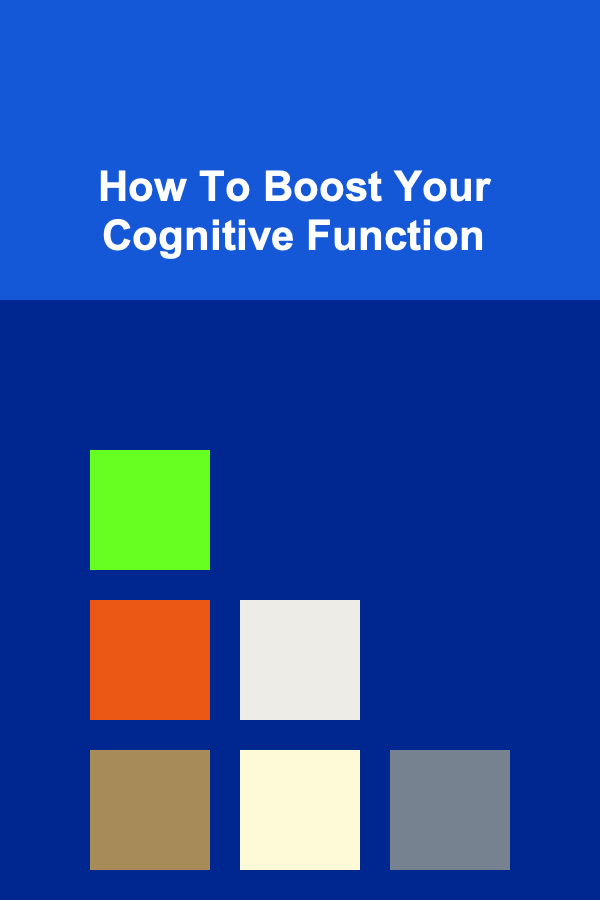
How To Boost Your Cognitive Function
ebook include PDF & Audio bundle (Micro Guide)
$12.99$5.99
Limited Time Offer! Order within the next:

Cognitive function encompasses a range of mental processes that allow us to perform tasks such as thinking, reasoning, learning, remembering, and problem-solving. It is the cornerstone of our ability to engage with the world around us, make decisions, and navigate everyday challenges. As we age, our cognitive abilities can decline, but the good news is that cognitive decline is not inevitable. Through various lifestyle changes, mental exercises, and external interventions, it is possible to boost cognitive function and maintain or even enhance mental sharpness throughout life. This article explores several ways to improve cognitive function, based on scientific evidence and research, from diet and exercise to mindfulness and sleep.
Nutrition and Diet: Fueling the Brain
Nutrition plays a vital role in brain health. Just as our muscles require proper nutrients to perform well, our brains rely on a range of vitamins, minerals, and fatty acids to function optimally. A poor diet can lead to cognitive decline, whereas a nutrient-rich diet can enhance brain performance. Below are some essential components that can improve cognitive function.
Omega-3 Fatty Acids
Omega-3 fatty acids, especially DHA (docosahexaenoic acid), are crucial for brain health. These healthy fats are found in abundance in fatty fish like salmon, mackerel, and sardines. They help build cell membranes in the brain, promote neural communication, and reduce inflammation. Research suggests that omega-3s can improve memory and cognitive function and protect against age-related decline.
Antioxidants
Antioxidants help combat oxidative stress, which occurs when there is an imbalance between free radicals and antioxidants in the body. Oxidative stress can lead to inflammation and damage to brain cells, impairing cognitive function. Antioxidants, including vitamins C and E, and flavonoids, found in foods like berries, dark chocolate, nuts, and leafy greens, help protect the brain from oxidative damage and promote better cognitive health.
B Vitamins
B vitamins, particularly B6, B12, and folate, are crucial for cognitive function. They help regulate levels of homocysteine, an amino acid that, when elevated, can increase the risk of cognitive decline and dementia. These vitamins are found in foods such as eggs, dairy products, leafy vegetables, and legumes.
Hydration
The brain is made up of around 75% water, making hydration crucial for optimal cognitive function. Dehydration can lead to difficulty concentrating, memory issues, and reduced mental clarity. Drinking sufficient water and consuming foods with high water content, such as fruits and vegetables, is essential for maintaining brain health.
Physical Exercise: Enhancing Brain Function through Movement
Exercise is widely known for its benefits to physical health, but it also plays a crucial role in boosting cognitive function. Regular physical activity helps improve circulation, increase blood flow to the brain, and enhance neurogenesis (the growth of new neurons). Here are some of the ways exercise can help with cognitive enhancement:
Cardiovascular Exercise
Cardio exercises like running, swimming, and cycling increase heart rate and blood circulation, which results in better oxygen and nutrient delivery to the brain. Cardiovascular exercise has been shown to improve memory, increase processing speed, and enhance executive functions such as planning and problem-solving. Studies indicate that regular aerobic exercise increases hippocampal volume, which is critical for learning and memory.
Strength Training
While cardiovascular exercise is essential for overall brain health, strength training also plays an important role in cognitive function. Research has shown that weightlifting and resistance exercises can help improve attention, planning, and problem-solving abilities. Strength training increases the production of brain-derived neurotrophic factor (BDNF), a protein that supports the growth of new brain cells and synaptic connections.
Yoga and Mind-Body Exercises
Mind-body exercises like yoga, tai chi, and Pilates offer both physical and mental benefits. These exercises combine physical movement with mindfulness and focus, which can improve cognitive function by enhancing attention, concentration, and memory. Studies have shown that yoga can increase gray matter in the brain, which is associated with better cognitive performance.
Mental Exercise: Keeping the Brain Active
Just as the body requires physical exercise to stay fit, the brain needs regular mental stimulation to maintain its cognitive function. Engaging in challenging activities that require critical thinking, problem-solving, and memory recall can strengthen neural connections and promote cognitive resilience.
Learning a New Skill
Learning something new, whether it's a language, an instrument, or a craft, challenges the brain and promotes cognitive flexibility. Neuroplasticity---the brain's ability to reorganize itself and form new neural connections---allows for the brain to adapt to new tasks. Studies have shown that learning new skills, especially complex ones like playing an instrument or speaking a foreign language, can enhance memory, concentration, and executive function.
Puzzle Games and Brain Teasers
Engaging in puzzle games such as crossword puzzles, sudoku, and logic games can enhance cognitive abilities. These activities stimulate the brain's problem-solving and reasoning capacities, promoting better memory and mental agility. Video games that require strategic thinking, planning, and multitasking can also help improve cognitive function, particularly in young adults and older adults.
Reading and Writing
Reading and writing are great ways to stimulate the brain and improve cognitive abilities. Reading provides exposure to new ideas, perspectives, and vocabulary, while writing exercises such as journaling or composing essays improve memory, focus, and creativity. Both activities also enhance the ability to concentrate for extended periods, which is critical for overall cognitive performance.
Mindfulness and Meditation: Calming the Mind for Clarity
Mindfulness and meditation have become widely recognized for their benefits to mental health and cognitive function. These practices involve focusing attention on the present moment, which can help reduce stress and improve brain function. Several studies have shown that mindfulness can lead to changes in brain structure that enhance cognitive performance.
Reducing Stress
Chronic stress can negatively impact cognitive function, especially in areas related to memory and decision-making. Mindfulness and meditation have been shown to reduce the effects of stress by calming the mind and promoting relaxation. Lowering stress levels through mindfulness practices can lead to improved focus, concentration, and decision-making abilities.
Enhancing Focus and Attention
Meditation practices that focus on breath awareness or mindful observation can improve attention and focus. Studies show that regular meditation enhances the brain's ability to focus on tasks for longer periods and reduces distractibility. This improved attention span can contribute to better memory retention and cognitive clarity.
Boosting Emotional Regulation
Meditation helps increase awareness of emotions and thoughts, fostering better emotional regulation. When emotions are better managed, cognitive function improves, as emotional interference often impairs the brain's ability to process information efficiently. Mindfulness practices can also enhance empathy and emotional intelligence, which can improve cognitive decision-making and problem-solving.
Sleep: The Foundation of Brain Health
Sleep is often referred to as the brain's "cleaning time." During sleep, the brain consolidates memories, processes information, and removes toxins that accumulate throughout the day. Adequate, high-quality sleep is essential for maintaining optimal cognitive function.
Memory Consolidation
Sleep plays a crucial role in memory consolidation, which is the process of stabilizing and storing memories. During the deep sleep stages, the brain replays and organizes experiences from the day, which strengthens memory retention and enhances learning. Lack of sleep can hinder memory formation, making it harder to recall information and solve problems.
Brain Detoxification
Research has shown that sleep helps remove waste products from the brain, such as beta-amyloid proteins, which are associated with Alzheimer's disease. This process occurs through the brain's glymphatic system, which becomes more active during sleep. Without sufficient sleep, the brain may struggle to clear these toxins, potentially leading to cognitive decline.
Enhancing Mental Clarity
Sleep restores cognitive function by refreshing the brain and improving mental clarity. Adequate sleep improves focus, attention, and the ability to think clearly. Chronic sleep deprivation can impair cognitive abilities such as problem-solving, creativity, and decision-making.
Social Connections: Engaging with Others for Cognitive Health
Social engagement has a significant impact on cognitive function, particularly in older adults. Socializing with friends, family, and colleagues provides mental stimulation, reduces feelings of isolation, and encourages cognitive challenges through conversation and shared activities.
Cognitive Stimulation
Engaging in conversations, debates, and group activities provides mental stimulation and helps improve cognitive function. Social interactions involve problem-solving, memory recall, and emotional intelligence, all of which contribute to brain health. Regular socialization has been linked to a reduced risk of cognitive decline and dementia in older adults.
Emotional Support
Social connections provide emotional support, which can reduce stress and anxiety. Positive relationships and social interactions promote mental well-being and help mitigate the negative effects of stress on cognitive function. Having a strong social support network also promotes a sense of purpose, which is essential for cognitive vitality.
Conclusion
Improving cognitive function is a multifaceted process that involves taking care of both the body and the mind. Through proper nutrition, regular exercise, mental challenges, mindfulness, quality sleep, and social engagement, we can enhance our cognitive abilities and protect our brains from age-related decline. By adopting these strategies, we can maximize our cognitive potential and enjoy a sharper, more focused mind throughout our lives.

How to Use Event Planning Skills to Make Money
Read More
How to Use Shelving Units to Maximize Sewing Room Space
Read More
How to Utilize Vertical Space in Shared Areas
Read More
Why You Should Use Clear Containers for Storage
Read More
How to Understand Capital Gains Tax
Read More
How to Design Character Dialogues with ChatGPT
Read MoreOther Products

How to Use Event Planning Skills to Make Money
Read More
How to Use Shelving Units to Maximize Sewing Room Space
Read More
How to Utilize Vertical Space in Shared Areas
Read More
Why You Should Use Clear Containers for Storage
Read More
How to Understand Capital Gains Tax
Read More